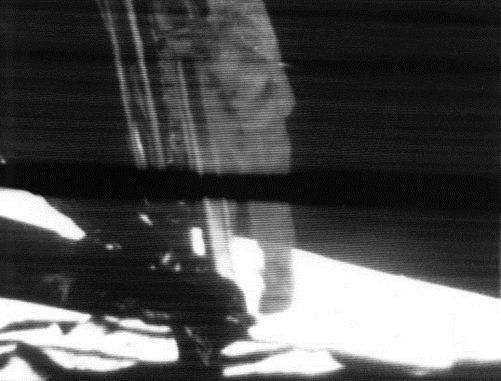

- © 2003 - 2024 Dynamix Productions, Inc. Contact Us 0



"It's an interesting place to be. I recommend it."
Astronaut Neil Armstrong commenting about the moon
Every time I hear the timeless phrase Neil Armstrong uttered while stepping on the moon, I can't help but remember the first time I heard it. It was 50 years ago at about 11:00 PM on July 20, 1969. I was eight-years-old and had fallen asleep waiting for them to get out of their strange looking space craft. Our family was vacationing in a cabin on a lake in southern Ohio, and Dad had hauled our portable black-and-white TV from home. We had a lot of trouble getting any TV stations out in the country on that little box. I seem to remember him fiddling with the rabbit ear antennas and positioning all of us at different places in the room like chess pieces so the picture wouldn't flutter.
So, rubbing my sleep filled eyes, I watched a white Gumby-like figure bounce down a ladder and onto the surface of another world. The significance wasn't lost on a boy only eight years into life. Then Armstrong delivered what is probably the shortest, yet most famous speech in all of human history, "That's one small step for man...." We strained not only to see him, but to hear him. "One giant leap for," he continued, "m_-_//_ _nd." What? There was static at the end covering the last word. What did he say? Piece of crap TV we had. We always had to bang on its top to keep it tuned to a channel.
As much as I want to blame it on our TV, the static was in the broadcast from the moon. Even CBS's Walter Cronkite had trouble understanding it during his live coverage. “I didn’t understand,” he said, "'One small step for man.’ But I didn’t get the second phrase.” Communications had been a problem for much of NASA's early years. In the minutes leading up to the horrific fatal fire aboard Apollo 1 during a ground test, the crew was having trouble communicating with Mission Control. “How are we going to get to the moon if we can’t talk between three buildings?," Gus Grissom barked into his headset.
As the lunar module (LM) Eagle descended to the moon's surface that day, Mission Control in Houston had trouble receiving data from it. Just like Dad moving us around for a better TV signal, a switch to and reposition of a different antenna on the LM solved it. But they were beaming voice and data 240,000 miles, so there were bound to be problems. The Eagle had a variety of radios for different activities and purposes, but LM to earth transmissions while on the surface primarily used microwave that combined voice and data, at about the same rate as a telephone modem in the early days of the web. They also employed UHF simplex transmissions, but mostly between the LM and command module that Michael Collins was circling in overhead. Once Armstrong and Buzz Aldrin were out of the LM, they deployed a larger dish antenna and pointed it at Houston for a stronger signal than what we heard Armstrong mutter his famous words on.
At the time, we all really knew what Armstrong said if we thought about it. But it seemed like there was another word missing. Armstrong always insisted that he said "That's one small step for (A) man,...," but nobody heard it at the time. The focus had always been on the scratchy part at the end of the speech. That one small word, "a," changes the meaning of the speech, if taken literally. "One small step for MAN" implies all of MANKIND in 1960s parlance, but we knew that he meant "one man" or "one mere human." Granted, Armstrong was exhausted and running on adrenaline at the time he said it. But studies have shown that it's entirely possible that he did say "A man," just very quickly. What's the last word? NASA's transcripts have the speech as "that’s one small step for (a) man,” so officially he said the "a." Maybe.